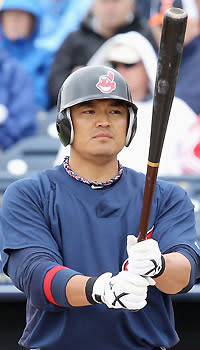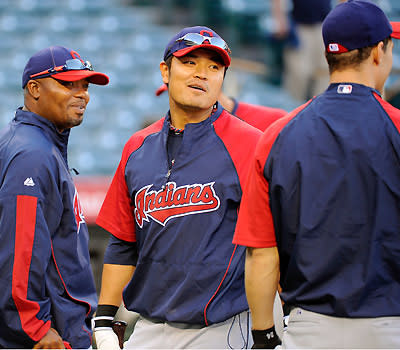He's become Big League Choo
ANAHEIM, Calif. – Ten years ago, Shin-Soo Choo(notes) left the port city of Busan, South Korea, his family and a sure-thing professional baseball career.
His father, So-Mien, had for so long encouraged him, telling him to be the best. In order to make that possible, however, Choo had to find the best, to play alongside the best and to learn the way.
Barely 18 and setting out on an indistinct path cleared by only a few of his countrymen, Choo shunned the Korea Baseball Organization and agreed to a contract with the Seattle Mariners, for whom he would go to the United States and learn its game. There had never been a Korean position player advance to the big leagues, stick in the big leagues and produce in the big leagues.
''I had a big, big goal,'' he said.
Carrying a 95-mph fastball and a power swing, a Korean-English dictionary and his father's words, – spoken so often they'd become his own – Choo did not pursue that ambition as much as he was obsessed by it.
''I'm not sure when I knew,'' he said. ''But, I thought about it every night, every day. 'I'll play in the big leagues.' ''
On Tuesday evening, an hour before the first pitch at Angel Stadium, Choo had sweat through his cap during batting practice. He is 27, built thick. His English is expressive and easy.
''Ten years,'' he said. ''I feel like it went really quick. I tell my wife all the time, 'Ten years ago I came here. I can't believe it.' ''
He relived the journey, beginning with the first day as a professional ballplayer, when the Mariners redirected him from a bullpen mound to the batting cage and told him to grab a bat, that he'd be an outfielder. There were merciless rides from one small town to another, when his only friends were his translator and game time. Unable to communicate without the aide, Choo said, ''I didn't talk to anybody. I had no friends. How could I? I couldn't have a secret.''
Then came the midsummer 2006 trade to the Cleveland Indians (for Ben Broussard(notes)), the Tommy John surgery a year later (remnants of his years as a pitcher), retracing his steps through the high minors and his full-time arrival in the big leagues in the summer of 2008, when he batted .343 with 11 home runs and 48 RBIs in the second half. A regular in right field in 2009, Choo was one of three major leaguers to bat at least .300, hit 20 home runs and steal 20 bases. Hanley Ramirez(notes) and Justin Upton(notes) were the others.
''His was one of the quietest emergences for a player of his skills,'' Indians president – and former general manager – Mark Shapiro said. ''But when a guy who has those tools along with a great work ethic, great discipline and, the final thing, the great desire to get better and be great, those are the players who become the complete players in the game.''
Going on a month into 2010, Choo leads American League right fielders in batting (.329) and on-base percentage (.449), and is among the leaders in home runs, steals and RBIs. There are few – if any – better outfield arms in baseball, his bringing comparisons to Vladimir Guerrero(notes) in his prime and Ichiro Suzuki(notes). While the Indians continue to build around the ideal of Grady Sizemore(notes), their do-it-all center fielder, many scouts believe Choo is becoming the better player.
Said one, speaking for many: ''He has five tools. And they all play.''
Extended out, his agent, Scott Boras, said, ''He has a chance to be the best Pacific Rim player ever over the course of his career. He got here before Ichiro, therefore he could have a longer, more prolific career.''
The exact length of his career – both as an Indian and as a major leaguer – is a bubbling topic in Cleveland. Choo will become arbitration eligible next winter and, as much as the Indians favor cost certainty through multi-year contracts, Boras generally lets year-by-year arbitration and, eventually, free agency, to run their natural courses.
Also, Choo, like all able-bodied South Korean men, owes his country two years of military service by the time he is 30. There are ways around it. Choo could request an extension, become a U.S. citizen, simply refuse to return to Korea or, ideally, help Korea win a major international baseball tournament (the South Korean government has waved the requirement in some cases). The Koreans likely will be favorites in November's Asian championships, but there is no guarantee Choo will be named to the team. KBO officials might rather reserve possible military deferments for their own players.
Choo, who'd rather not rankle the government, generally avoids the subject. Instead, he remains keenly on a path largely of his own making, and of his father's words and deeds. When the American scouts came to watch Choo in high school, So-Mien borrowed a car to drive them through Busan. When there were too many scouts for the car, So-Mien had the scouts drive ahead and he walked the two miles to the next destination.
''He is a great man,'' said Ted Heid, then a Mariners area scout in Asia (and now the club's coordinator of special projects international), ''and he expected a lot from his son.''
Heid recalled Choo in high school as a pitcher and a designated-hitter, who, when occasionally positioned in the outfield, ''Usually was practicing his swing.''
But mostly he recalled how driven Choo was to validate his decision to leave Korea, how Choo reported to the Mariners' facility in Peoria, Ariz., and every day was the first to arrive and the last to leave.
''Shin-Soo,'' the clubhouse attendants would plead, ''would you please go home?''
''He knew,'' Heid said, ''he had to make it. There were a lot of people [in Korea] saying, 'You made a mistake. You should have taken the easy way, stayed here and been a superstar.' Shin-Soo is unique. A wonderful young man. And he's not afraid of the challenge.''
It remains, of course. The years pass, the challenge does not.
''A lot of Koreans, the young players, are really scared to come here,'' Choo said. ''You're not guaranteed to play in the big leagues. They know it's really hard.''
Choo came anyway, because he had a big, big goal.
To become the best.


